 |
|
|

|
in Focus
|
|
|
|
|
|
|
|
|
|
|
MoF
|
|
|
Union Budget 2024-25
|
|
The Union Budget 2024-25 (Budget 2024) has largely been welcomed by industry. It is encouraging to note the government's continued emphasis on technology as a fundamental driver of progress across various sectors. From fostering start-ups and attracting investors to advancing manufacturing, agriculture, solar power, and the space economy, the Budget seeks to leverage both traditional and contemporary avenues for sustainable progress. Some of the key announcements for the technology services industry are as follows:
|
|
|
|
|
1.
|
Expansion in scope of safe harbour regime under transfer pricing: The announcement to expand the scope of safe harbour rules and streamlining of transfer pricing assessment procedures is a welcome step. This is in line with nasscom’s recommendations. We will now be working with the government on the details so that the budget announcement is translated into actual reforms in the safe harbour and transfer pricing framework. An attractive and globally competitive transfer pricing regime is expected to ease business for GCCs and the IT services industry.
|
|
|
2.
|
Abolition of Angel Tax: The government's announcement to completely abolish the Angel Tax has sent a positive signal to the start-up ecosystem. This is a significant ease of doing business measure and addresses a long-standing request from the industry and nasscom. Such a tax does not exist elsewhere in the world, and its abolition will remove a key deterrent for start-ups and investors in bringing in capital.
|
|
|
3.
|
Reduction in TDS from 1% to 0.1%: This reduction, applicable for, payments made by ecommerce platforms to sellers will help in unlocking working capital for the sellers on ecommerce and encourage sellers to participate in ecommerce activity.
|
|
|
4.
|
Abolition of 2% equalization levy: Nasscom had advocated the abolition of the 2% equalization levy on e-commerce supply of goods or services. While this was transitory provision, doing away with it sends a positive signal for the industry.
|
|
|
5.
|
Allowing credit of Tax Collection at Source (TCS) against TDS on salary This will ease compliance and ease cash flow in the hands of employees. This is in line with our recommendations.
|
|

|
Read More
|
|
|
|
|
| On July 26, 2024, nasscom conducted an interactive session on Union Budget 2024-25 to discuss the impact on Tech Sector. The session had about hundred participants from the industry. During the session, we discussed the proposals related to revamp of the Income Tax Act, levy of tax in the hands of shareholder on buyback of shares by a company, nuances around abolition of angel tax from prospective effect, proposed changes in the capital gain tax regime and TDS. Recording of the discussion is available here.
|
|
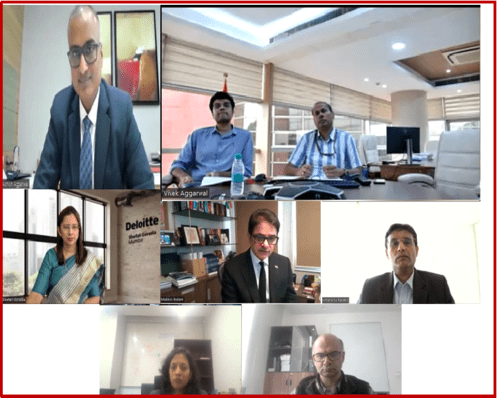 |
|
| As a next step, Nasscom is finalising a detailed post budget memorandum highlighting concerns and recommendations to strengthen the budget proposals. Please reach out to tejasvi@nasscom.in for more information.
|
|
|
|
|
|
|
|
|
|
|
|
|

|
SUBMISSIONS AND REPRESENTATIONS
|
|
|
|
|
|
|
|
|
|
|
KARNATAKA GOVT
|
|
|
Karnataka Platform based Gig Workers (Social Security and Welfare) Bill, 2024
|
|
After Rajasthan enacted a law last year, Karnataka has released a draft law for social welfare of platform-based gig workers, thereby creating a duplicate structure of state and central law (CoSS). Earlier this year, even Haryana had proposed making a state law (no draft law has been released till date) to which nasscom had responded. While the Karnataka Bill is similar to the Rajasthan law, it goes a step ahead and alters the basic concept of ‘gig worker’ by treating it at par with employment which can impact the state’s gig economy. Besides, the Bill imposes intrusive obligations on platforms likely to compromise their operational decision-making. While we have given a detailed representation, given a bill of this significance which could set a bad precedent for other states, we have sought a detailed public consultation with stakeholders.
|
|
|
|
|
|
|
|
|
|
|
|
JHARKHAND GOVT
|
|
|
Jharkhand Platform Based Gig Workers (Registration and Welfare) Bill, 2024
|
|
Immediately after Karnataka, Jharkhand also released a draft Bill for social welfare and protection of platform-based gig workers. Although the Bill is substantially similar to the Karnataka Bill and carries the same set of challenges, the Bill at least does not unsettle the definition of 'gig worker' and broadly aligns with the CoSS. While we have provided detailed feedback on the Bill, we have sought a detailed public consultation with the stakeholders.
|
|
|
|
|
|
|
|
|
|
|
|
MEITY
|
|
|
Power related Issues faced by the Data Centre Industry
|
|
We attended an industry consultation convened by MEITY to discuss the power related issues faced by DCs. This was followed by our detailed representation to MEITY where we have highlighted that the draft DC policy pending for nearly four years since 2020 needs to be finalised. This would serve as a credible reference to the States to develop a cohesive approach in their DC policies. Further, we have requested for a working group with both central and state level government/regulators to be constituted to identify and address power-related issues faced by the DC industry. Specific recommendations on dual power grid network, RE banking, tariff rates, DC parks, etc. have been made.
|
|
|
|
|
|
|
|
|
|
|
|
MOCI
|
|
|
Promote EODB for Units In SEZ
|
|
Nasscom has been actively engaging with the MOCI to address various operational and procedural challenges faced by units operating in SEZ. These efforts are part of our ongoing commitment to facilitate ease of doing business and enhance the competitiveness of the IT-ITeS sector in India. Over the past months, we have consolidated feedback from industry and identified key areas that require attention. We recently made a representation highlighting various operational and procedural issues being faced by units in SEZ. These included:
|
|
|
|
1.
|
Introduction of virtual identity cards by units operating in SEZ which is accessible to employees of SEZ units on company's mobile application.
|
|
|
2.
|
The depreciation period for goods other than computers should be changed from the current 10 years to 5 years.
|
|
|
3.
|
Clarify that SEZ unit will be entitled to depreciation benefit while making payment of duty on de-bonding of capital goods.
|
|
|
4.
|
Change from approval process to intimation process in case of zone-to-zone transfer.
|
|
|
5.
|
Simplifying the process of service invoice endorsement.
|
|
|
6.
|
Supply of services in DTA against Indian Rupees to be allowed without any restriction and
|
|
|
7.
|
Expansion of the list of authorised services.
|
|

|
Read More
|
|
|
|
|
|
|
|
|
|
|
|
|
MOF
|
|
|
World Bank Business Ready project
|
|
Business Ready (B-READY) is the World Bank's new flagship report, which has replaced the Doing Business report. B-ready project aims to benchmark the business environment and investment climate in economies worldwide. Nasscom is a part of committee constituted by MoF and is working closely on the taxation aspect of B-READY project. We are proactively collaborating with the industry to gather comprehensive insights and feedback on the taxation aspects. We have consolidated the industry's experiences, challenges, and suggestions to provide a thorough response to the B-READY questionnaire.
|
|
|
Recently, nasscom had a meeting with the MoF to discuss the questionnaire on taxation, which seeks to measure the quality of taxation regulation, administration, and implementation from a firm's perspective. The Ministry has acknowledged the depth and relevance of the insights shared by nasscom, recognising the value of industry-specific perspectives in shaping a more accurate assessment of India's business environment. We will continue to advocate for reforms that can further improve India's business environment. In case you are interested in this topic or want more information, please reach us at tejasvi@nasscom.in.
|
|
|
|
|
|
|
|
|
|
|
|
|

|
DIALOGUE & DISCUSSION
|
|
|
|
|
|
|
|
|
|
|
International Association of Privacy Professionals (IAPP)
|
|
|
IAPP Asia Privacy Forum 2024
|
|
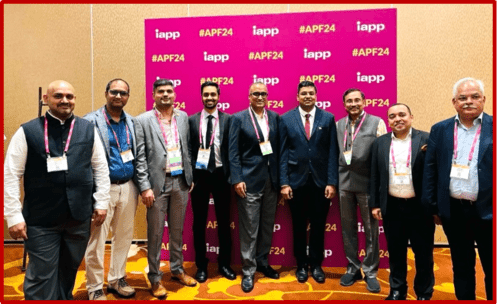
|
|
|
The IAPP Asia Privacy Forum 2024 was recently held in Singapore, as part of the Personal Data Protection Week organised by the PDPC, Singapore. Ashish Aggarwal was a panellist on a session on the Indian DPDPA, along with Rakesh Maheshwari and Nehaa Chaudhari, moderated by Bilal Mohamed. Ashish talked about industry’s readiness to implement the new law, the focus of the law to enable an effective and speedy redress of complaints, its encouragement for deployment of technology to effectively operationalise the law, including mechanisms to empower users to effectively use consent to manage their data rights.
|
|
|
|
|
|
|
|
|
ESYA Centre
|
|
|
Digital Competition Bill, 2024
|
|
|
A roundtable discussion was organised by the ESYA Centre to discuss industry's feedback on the draft Digital Competition Bill, 2024. The meeting had government representatives, including the MCA Secretary and the CCI Chairperson. At the roundtable, Sudipto Banerjee, stressed upon the need to re-examine the need for an ex-ante law considering the present market structure, available evidence and past enforcement experience of CCI.
|
|
|
|
|
|
|
|
|
ESYA Centre
|
|
|
Emerging Trends in Antitrust
|
|
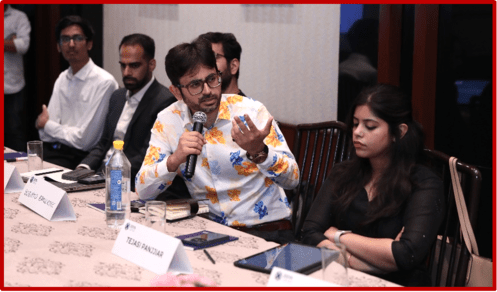 |
|
|
A roundtable discussion was organised by the ESYA Centre on Emerging Trends in Antitrust and lessons from global experiences. Professor Christopher Yoo from the University of Pennsylvania lead the discussion. At this roundtable, Sudipto Banerjee inquired with Professor Woo whether, basis enforcement experience, there are globally identifiable benchmarks or practices where ex-ante approach could be explored in digital markets.
|
|
|
|
|
|
|
|
|
The Dialogue
|
|
|
Launch of Open Loop India Report
|
|
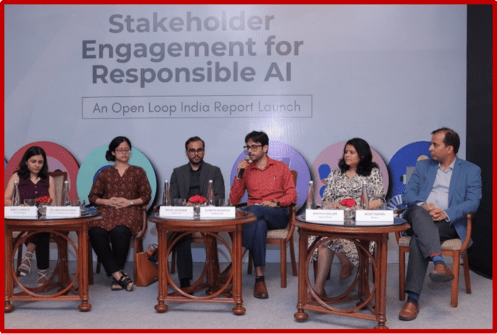 |
|
|
The Dialogue had organised a panel discussion for the launch of Open Loop India Report. The theme of discussion was the findings of the report with a focus on stakeholder engagement across the AI value chain. As a panellist, Sudipto Banerjee discussed the possible incentive structure, along with costs and benefits of designing such stakeholder's engagement in start-ups and large enterprises.
|
|
|
|
| |
|
|
|
|
|
|
|

|
NEW & UPCOMING
|
|
|
|
|
|
|
|
|
|
|
TRAI
|
|
| Consultation Paper on the Framework for Service Authorisations to be Granted Under the Telecommunications Act, 2023
|
| TRAI issued a consultation paper seeking comments on terms and conditions of authorisations under the Telecommunications Act, 2023. The Act provides for obtaining an authorisation by any entity/person intending to provide telecommunication services, subject to such terms and conditions, as may be prescribed. The last date to provide comments and counter comments was Aug 1, 2024, and August 8, 2024. TRAI has given extension and now the revised timeline for comment and counter-comments is August 8, 2024, and August 16, 2024, respectively. In case you are interested in the subject, kindly write to policy@nasscom.in to share your input.
|
|
|
|
|
|
|
|
|
DOT
|
|
| Draft ROW Rules
|
|
Pursuant Telecommunications Act, 2023, DOT has issued draft Rules on ROW. These cover the establishment and maintenance of underground and overground telecommunication networks in public property and rights relating to existing telecommunication networks. The last date to provide inputs to DOT on these Rules is August 8, 2024. In case you are interested in the subject, kindly write to policy@nasscom.in to share your input.
|
|
|
|
|
|
|
|
|
NTIPRIT
|
|
| National Digital Communications Policy (NDCP)
|
|
The DOT has tasked NTIPRIT to lead consultation on NDCP-2024. This policy intends to serve as a roadmap for the development of India's digital communications sector for the next five years. NTIPRIT has sought inputs on key focus areas and implementation strategies, plans, and targets, including any change in legislative or regulatory process to support the policy framework. The last date to submit comments was August 1, 2024, but we have sought a 30-day extension to provide our comments. In case you are interested in the subject, kindly write to policy@nasscom.in to share your inputs by August 20, 2024.
|
|
|
|
|
|
|
|
|
DOCA
|
|
| Prevention and Regulation of Unsolicited and Unwarranted Business Communication
|
|
DOCA released draft guidelines on June 20, 2024, with the aim to protect consumers from unfair trade practices and violations of their rights by preventing unsolicited and unwarranted business communications, in the form of voice calls, SMS, and instant messaging applications including through social media platforms. If you are interested in the issue, kindly send your input to policy@nasscom.in.
|
|
|
|
|
|
|
|
|
|
|
RBI
|
|
| Framework on Alternative Authentication Mechanisms for Digital Payment Transactions
|
|
RBI released a draft framework on July 31st, 2024, with the aim to enable the payments ecosystem to adopt alternative authentication mechanisms and widen the choice of authentication factors available to payment system operators and users. The proposed framework will be applicable to all Payment System Providers and Payment System Participants (banks and non-banks). If you have any comments, input or feedback on the proposed framework, kindly send these to policy@nasscom.in by September 4th, 2024.
|
|
|
|
|
|
|
|
|
|
|
|
|
|

|
OTHER UPDATES
|
|
|
|
|
|
|
|
|
|
|
MOF
|
|
| ECONOMIC SURVEY
|
| The Economic Survey 2023-24 was tabled in Parliament on July 22, 2024. The Survey presented a review of the developments in the economy over the last year. We, at nasscom, focus on enabling growth, innovation, securing ease of doing business reforms, tax certainty, and a high-growth environment for tech industry and start-ups in India. Some of these objectives are aligned with economic survey. The Survey recognised that for effective policy making, forging and sustaining consensus between governments, businesses and the social sectors are necessary. The survey highlights that India's services exports grew by 4.9% to USD 341.1 billion in FY24, with growth largely driven by IT/ software services and 'other' business services. The growth in Global Capability Centres (GCCs) is reflected in the services balance of payments, with 'Other Business Services' being the second-largest contributor in services exports in FY24 (26%), after IT services (48%). The survey acknowledged that uncertainties and interpretations related to transfer pricing, taxes, import duties and non-tax policies remain to be addressed in order to sustain the interests of the overseas investors.
|
|
|
|
|
|
|
|
|
|
|
|
|
|
DPIIT
|
|
|
Public Procurement (Preference to Make in India) Order 2017
|
|
To encourage 'Make in India' and promote manufacturing and production of goods and services in India, DPIIT had issued the first Public Procurement (Preference to Make in India), Order in June 2017. In a fresh revision to this order, DPIIT has now issued PPP-MII Order dated July 19, 2024. The key changes in the order include a) Excluding items that don't contribute to domestic value addition. b) Classifying manufacturers using the PLI scheme as deemed class II suppliers. c) Requiring procuring entities to ask for a cost breakdown of all imported content, including locally sourced items and taxes, as well as license/technical/royalty fees paid outside India etc. These changes may increase compliance and cost burdens for software service providers, requiring detailed cost breakdowns and OEM certificates. Providers may need stronger local partnerships to localize more of their operations to meet mandatory sourcing requirements and ensure their offerings contribute to domestic value addition. Additionally, manufacturers under the PLI scheme will be classified as class II suppliers. This may benefit suppliers whose local value addition was less than 20% and which otherwise did not qualify as Class II Local suppliers. In this regard, nasscom is working with the industry to reach an understanding on the parameters for calculation of local value addition for procurement of software products and cloud services and whether international models can be suitably adopted in India by making certain necessary modifications for the benefit of all. In case of any feedback on the above, please write to us at policy@nasscom.in.
|
|
|
|
|
|
|
|
|
|
|
|
MOF
|
|
|
General Financial Rules (GFR) 2017
|
|
GFRs are a compilation of rules and orders of Government of India to be observed by all Departments and Organizations under the Government and specified Bodies. In a move to streamline the procurement process, the DEPP has issued the amended General Financial Rules (GFR 2017) dated 10.07.24. The amendment enhances the financial limits of procurement for: a) Repair Works, b) Open and Limited Tenders, c) Government e-Marketplace (GeM), d) Purchase by Local Purchase Committee e) Limited Tender Enquiry (LTE) etc. The thresholds for both open and limited tenders have been increased, allowing contractors aiming for higher-value projects an expanded range of opportunities within the open tender process. This is likely to aid smoother procurement for higher-value items that previously required a more extensive tendering process. Limits for buying goods and services from GeM have been increased for all three tiers of procurement allowing for reverse auction of twice the order size than previously available, this is likely to benefit medium and large suppliers in the industry. Suppliers who offer specialized or niche products and services not listed on GeM may also benefit from increased opportunities for higher-value contracts under new limits for purchase by Local Purchase Committee.
|
|
|
|
|
|
|
|
|
|
|
|
|
|



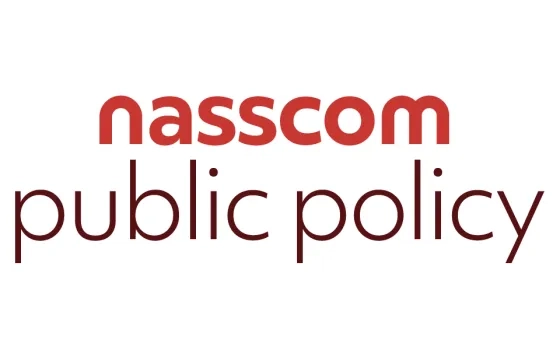












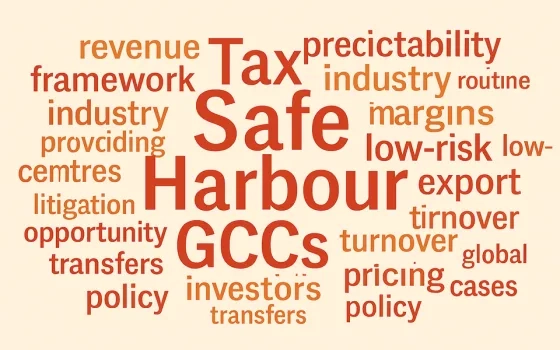

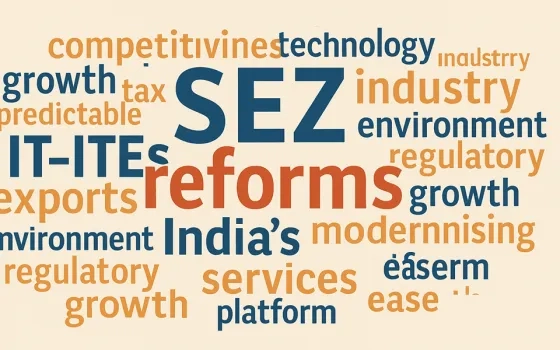

![[UPDATE] Release of Guidelines for Examination of Computer-related Inventions (CRIs), 2025](https://community.nasscom.in/sites/default/files/styles/560_x_350/public/media/images/For%20Blog%20-nasscom%20public%20policy%20960%20x%20600%20png_14.png.webp?itok=TVoaAkX5)
